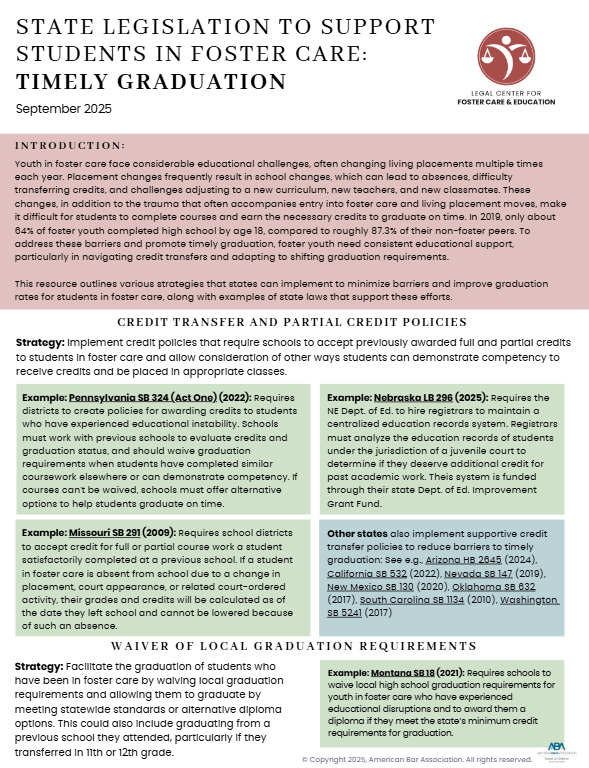
State Legislation
Students in foster care face many barriers to educational success that can be addressed through multi-strategy approaches at the federal, state, and local levels. One of these strategies includes passing and implementing state legislation to support the needs of students in foster care. This page highlights critical education topical areas in which states can pass legislation to improve educational experiences and outcomes and provides an example in each category. Some topics also have an issue brief that provides a deeper look at legislative strategies and state examples. While state legislation not specific to child welfare involvement can have a significant impact on students in foster care, this series focuses on state legislation that specifically addresses the education of students involved with the child welfare system. Additionally, many states have regulations, agency policies, memoranda of understanding, and court rules that impact students in foster care. We have not included those on this page, although they are all important sources of legal authority that can be effective targets for advocacy to support students in care. If you have any questions or are interested in technical assistance related to state legislation, please contact ccleducation@americanbar.org
Topic Issue Briefs
Categories & State Examples
ENSURING SCHOOL STABILITY AND PROPER ESSA IMPLEMENTATION
Arizona SB 1205 (2023)- Lists the individuals who should be consulted and factors to be considered when making a best interest determination; clarifies transportation responsibilities among agencies for children in care; requires data collection related to education stability.
All states have been working on implementation of the school stability provisions found in ESSA since 2015. Several of those states have passed state laws to advance these implementation efforts. State legislation trends have emerged to:
Codify best practices for best interest determinations.
Ensure transportation is arranged, provided, and funded.
Establish child welfare and education state and local points of contact and ensure they have the necessary training and capacity.
Establish dispute resolution protocols to quickly resolve disagreements between agencies while minimizing disruption to a student’s education.
Promote collaboration between education and child welfare agencies.
ADDRESSING EDUCATION THROUGH CHILD WELFARE COURTS
Idaho code § 16-1622- For permanency plans and hearings, requires the child welfare department to document, and the court to inquire as to the efforts made to ensure educational stability for the child. This must include the efforts made to keep the child in the school where they were enrolled at the time of placement, or a determination that remaining in the school is not in the child's best interests.
Courts oversee a child’s foster care placement. This oversight needs to include a focus on the child’s well-being, including their education stability and success. State legislation trends have emerged to:
Require courts to inquire about and consider a child’s education in child welfare proceedings.
Require courts to appoint or identify educational decisionmakers (EDMs) for children.
CLEARLY IDENTIFIED EDUCATIONAL DECISION MAKERS (EDMS)
Washington RCW 13.34.045- Requires an educational liaison for students in grades 6-12 to be identified at each hearing in the dependency process. The liaison is presumed to be the youth’s parent, and if they cannot serve as the liaison, it is preferred to be a relative or someone known to the youth. This person should be committed to providing ongoing educational supports for the youth.
Students in foster care need to have a clearly identified educational decision maker throughout their time in care. This often remains with the parent, but at times another individual may need to be appointed. State legislation trends have emerged to:
Respect parental rights by retaining their educational decision-making authority when appropriate.
Ensure clear EDM appointment and identification protocols are in place.
Require and provide training.
Ensure kinship caregivers have the necessary authority to participate in educational decisions for children in their care.
DATA COLLECTION AND INFORMATION SHARING
Michigan HB 4677 (2024)- Requires the child welfare and education departments to provide an annual report with data including the number of children in foster care and data about that group regarding school stability, discipline, absenteeism, test scores, special education, and graduation.
A critical multi-system strategy to support students in foster care is to improve information sharing and data collection across systems. State legislation trends have emerged to:
Collect data about students on foster care across a range of outcomes such as attendance, school stability, academic performance, graduation, discipline, etc.
Make the data publicly available and share findings in a report.
Track and share data for individual students so schools, child welfare agencies, and caregivers have timely access to the information they need to support students in care and promote seamless school transitions.
For additional detail and examples, see our state legislation on data page, and our data toolkit resource page.
EDUCATION AND CONGREGATE CARE
Connecticut HB 6705 (2013)- Requires each youth in a secure facility to have a case plan that describes their educational needs and grade-level performance and identifies what supports or services will or are being provided to support academic performance.
While child welfare systems work to prevent unnecessary placements into congregate care facilities, students who do require that level of support continue to need support to ensure their educational needs are addressed within these facilities and during transitions in and out of them. State legislation trends have emerged to:
Allow students in congregate care placements to attend off-site community schools when possible.
Require educational curriculums in facilities to align with grade-level standards and graduation requirements.
Guarantee academic instructional hours equivalent to off-site school settings.
Provide oversight to ensure students in congregate care placements are receiving appropriate educational services.
ENSURING NORMALCY AND FULL PARTICIPATION
Nevada SB 257 (2017)- Clarifies that students in foster care have the right to have reasonable access to participate in extracurricular, cultural and personal enrichment activities; creates a fund to provide financial support to allow those students to participate in such activities, and provides protection from liability for caregivers who allow children in their care to participate in such activities if they follow the “reasonable and prudent parent” standard.
Students in foster care deserve as normal an experience as possible in their home and school lives but often face barriers like access to resources and school and placement instability. State legislation trends have emerged to:
Waive fees for extra-curricular activities and specialized academic programs.
Ensure students can participate in activities if transfers caused them to miss deadlines.
IDENTIFICATION AND SUPPORT IN SPECIAL EDUCATION
Georgia HB 855 (2020)- When a student in foster care is enrolled in a school, this law requires local school systems to assess whether exposure to trauma has had or is likely to have an adverse impact on a student’s educational performance, including both academics and classroom behavior. This assessment is part of an overall determination of whether the student is eligible for special education and related services, and what services, if any, should be provided.
Students in foster care are involved in the special education system at significantly higher rates than their non-foster peers. State legislation trends have emerged to:
Ensure proper keeping and transfer of records related to special education evaluations and services.
Codify best practices to ensure students with disabilities receive a free and appropriate education in the least restrictive environment.
INCREASED EDUCATIONAL SUPPORTS
Colorado HB 1374 (2023)- Expanded the Fostering Educational Opportunities for Youth in Foster Care Program that improved educational outcomes for students in foster care, including attendance, discipline, and rate of passing classes when it was piloted in Jefferson County. The program pairs students in out-of-home care with Educational Specialists who support them and their caregivers in school and beyond.
Students in foster care can benefit from a wide range of education supports to achieve educational stability and success. State legislation trends have emerged to:
Provide tutoring or other specialized academic support for students in foster care.
Fund wraparound support programs to ensure the holistic needs of students and their families are met.
Elevate students with lived experience to advisory and policy-making roles.
REDUCE THE NEED FOR AND IMPACT OF DISCIPLINARY ACTIONS
California AB 740 (2022)- Requires notice to a child’s social worker, attorney, and educational rights holder if a child in foster care is suspended for longer than 1 class period.
Data has shown that students in foster care experience higher rates of disciplinary actions than their non-foster peers. State legislation trends specifically addressed discipline for students in foster care have emerged to:
Require due process procedures before suspension or expulsion.
Promote restorative justice practices and alternatives to suspension and expulsion.
Provide trauma-informed services as needed to students who are or have been involved with the child welfare system.
PROMOTE TIMELY GRADUATION
Pennsylvania Act 1 (2022)- School entities must clearly define how full and partial credits will be assessed, ensure that students are awarded full or partial credits for work satisfactorily completed at prior schools, and may waive any course needed for graduation if the student has completed similar course work or demonstrates competence in the content area. If a student is not able to graduate from their current school or a prior school, they can receive a “Keystone Diploma” by meeting statewide graduation requirements.
Too often students in foster care experience delays to graduation, and sometimes fail to graduate, due to their foster care experiences. State legislation trends have emerged to:
Require procedures for transferring credits and granting partial credits.
Waive local graduation requirements if students meet state requirements.
Require planning throughout high school to ensure students remain on track to graduate.
ACCESSING AND COMPLETING HIGHER EDUCATION
Maryland §15–106.1- Exempts youth in foster care or who were in foster care for at least a year at age 13 or later from paying any tuition at a public college or university. Requires universities to give foster youth priority for on-campus housing and to designate a homeless and foster student liaison to assist those students with the financial aid process. Mandates data collection and reporting to assess how many students use this program and earn degrees.
Far too few students in foster care are able to access, much less complete, higher education, despite their strong desire to do so. More supports are needed to ensure this is an opportunity available to students in and exiting care. State legislation trends have emerged to:
Support students with pre-college requirements such as waiving the costs of applications and standardized tests.
Provide free tuition for students in foster care.
Provide financial support for housing, textbooks, and other expenses beyond tuition.
Require staff and policies at colleges to support students who are or have been in foster care.
More information and resources coming soon!

















